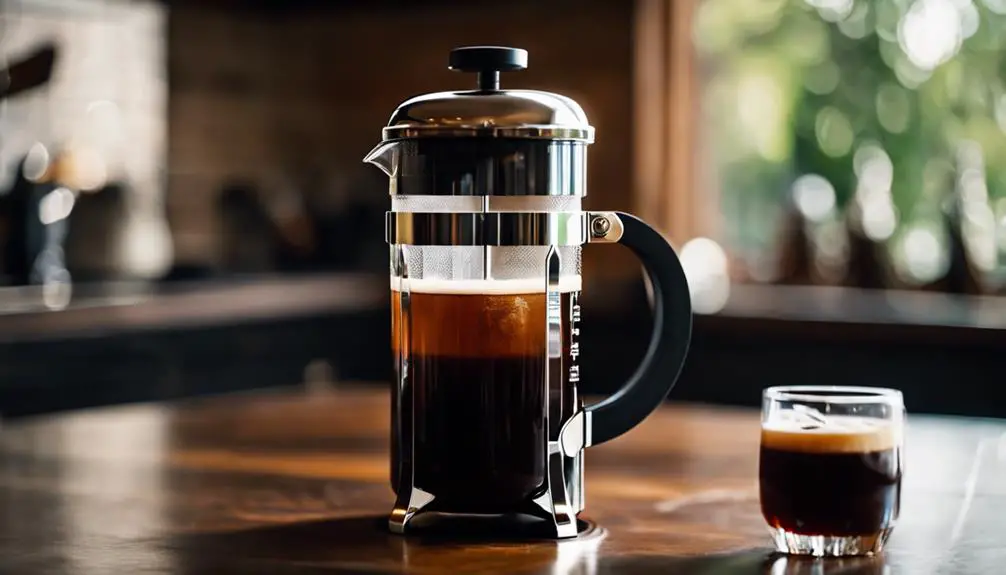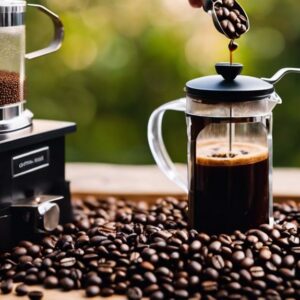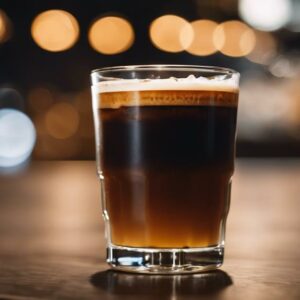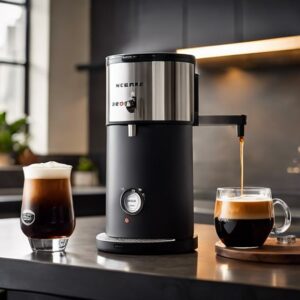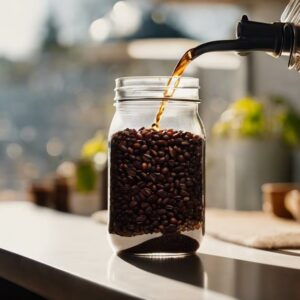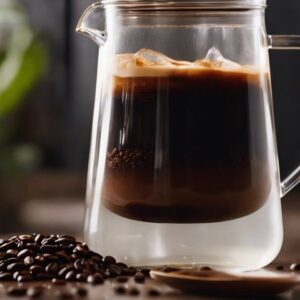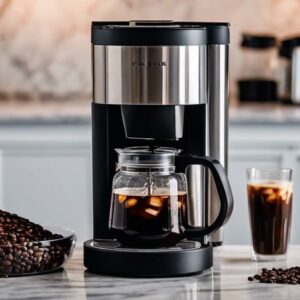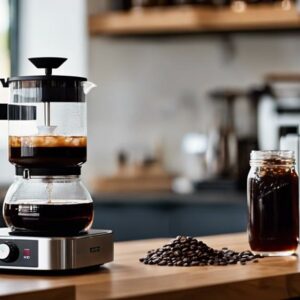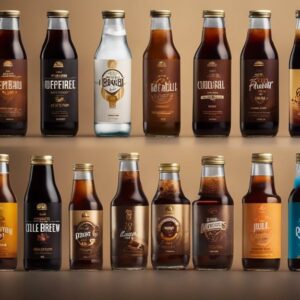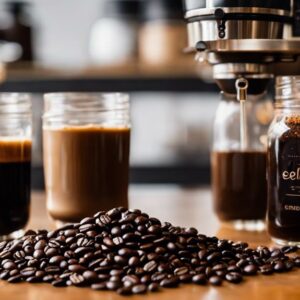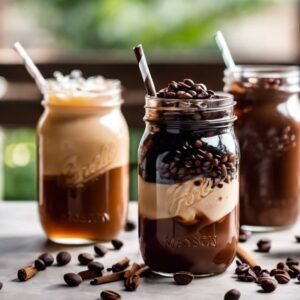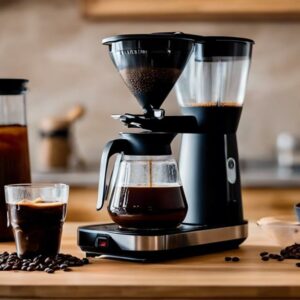In a world where coffee preferences are as diverse as the beans themselves, the choice between French Press and Cold Brew Press can be a daunting one. The nuances of these brewing methods go beyond just the surface level, impacting everything from taste to convenience.
As you sip your morning cup, ponder this: which method truly reigns supreme in the realm of coffee brewing? The answer may surprise you.
With years of experience as a professional barista and a deep passion for exploring different coffee brewing techniques, I have gained valuable insights into the world of coffee that I am excited to share with you.
French Press vs Cold Brew Press: Brewing Methods
French Press uses hot water to steep coffee grounds for a few minutes before pressing, resulting in a rich and bold flavor.
Cold Brew Press involves steeping coffee grounds in cold water for an extended period, usually 12-24 hours, producing a smoother and less acidic taste.
French Press
When brewing with a French press, you’ll notice it involves a direct infusion method. This method requires coarse coffee grounds steeped in hot water for a few minutes.
The French press equipment consists of a plunger, a mesh filter, and a glass or stainless steel container.
Overview and Basic Principles
Enhancing the rich and robust flavors of coffee, the French Press brewing method offers a straightforward and immersive experience for coffee enthusiasts.
- Explore diverse brewing techniques to unlock unique flavor profiles.
- Adjust strength levels easily by altering coffee-to-water ratios.
- Enjoy versatile serving options, from hot to iced coffee.
- Immerse yourself in the art of French Press brewing for a truly personalized coffee experience.
Required Equipment and Ingredients
To brew coffee using a French Press, you’ll need specific equipment and ingredients.
- Quality coffee beans ground to a coarse consistency.
- Hot water just off the boil.
- French Press with a plunger and a heatproof glass carafe.
- Timer for precision in brewing techniques and experimenting with ingredient variations.
Cold Brew Press
When making cold brew press, remember the basic principles and equipment needed. The process involves a few simple steps and specific ingredients.
Let’s explore the key points further in the comparison between French Press and Cold Brew Press.
Overview and Basic Principles
For crafting a smooth and rich cold brew using a press, understanding the fundamental principles and techniques is essential.
- Experiment with different brewing techniques to unlock diverse flavor profiles.
- Tailor your cold brew to match your unique coffee preferences.
- Explore innovative brewing equipment to enhance your brewing experience.
- Embrace creativity and adaptability in your cold brew press journey.
Required Equipment and Ingredients
Unlocking the full potential of your cold brew press requires having the right equipment and ingredients at your disposal.
- Equipment Comparison: Choose a cold brew press specifically designed for the cold brewing process.
- Ingredient Differences: Opt for coarsely ground coffee beans and cold water for the perfect cold brew.
- Additional Tools: Consider using a digital scale for precise measurements and a timer for consistency.
- Storage Containers: Use airtight containers to store your cold brew concentrate for freshness.
French Press vs Cold Brew Press: Brewing Process
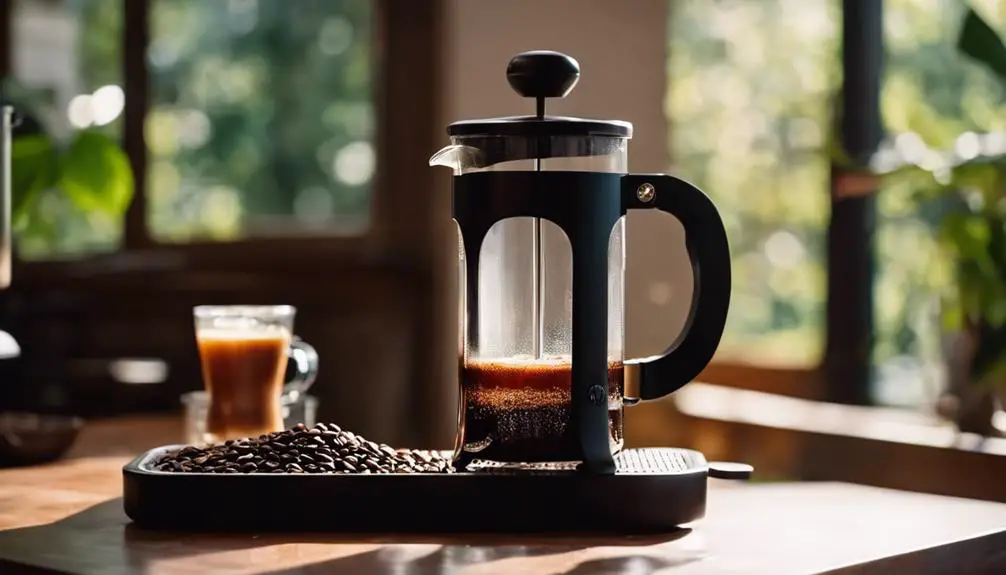
When comparing the French Press method to the Cold Brew Press method, you’ll notice distinct differences in the brewing process.
The French Press involves steeping coarsely ground coffee in hot water before plunging the filter, whereas the Cold Brew Press method entails steeping coffee grounds in cold water over an extended period.
These unique brewing processes result in varying flavors and characteristics in the final coffee product.
French Press Method
When brewing with a French press, you’ll follow a simple step-by-step guide to achieve a rich and aromatic coffee.
The brewing time for French press coffee is relatively short compared to cold brew, providing a quick and flavorful cup of joe.
Let’s explore the nuances of this method and how it affects the final outcome of your brew.
Step-by-Step Guide
For a quick and flavorful brewing experience with the French Press method, gather your coarsely ground coffee, hot water, and trusty French Press.
- Boil water to around 200°F for optimal extraction.
- Add coffee grounds to the French Press.
- Pour hot water over the grounds and stir gently.
- Let the coffee steep for about 4 minutes before pressing the plunger down slowly.
Brewing Time
To master the perfect brewing time with the French Press method, focus on timing and precision for a rich and aromatic coffee experience.
- Comparison: French Press brewing takes about 4 minutes, while Cold Brew Press requires 12-24 hours.
- Pros: French Press offers a quicker brewing time for immediate coffee satisfaction.
- Cons: Cold Brew Press demands patience but delivers a smooth, low-acid brew.
- Innovation: Experiment with different brewing times to discover your ideal coffee flavor profile.
Cold Brew Press Method
Let’s talk about the Cold Brew Press Method now.
You’ll find a step-by-step guide and information on the brewing time for this method.
Understanding these points will help you see the differences between the French press and cold brew press techniques.
Step-by-Step Guide
Start by grinding your coffee beans to a coarsely ground consistency for the Cold Brew Press Method.
- Mix the grounds with cold water in a 1:4 ratio.
- Let the mixture steep in the refrigerator for 12-24 hours.
- After steeping, press the plunger slowly to filter out the grounds.
- Dilute the concentrate with water or milk to your desired strength.
Brewing Time
In the Cold Brew Press Method, the brewing time significantly differs from the French Press process.
- Brew time comparison: Cold Brew Press requires an extended brewing period, typically ranging from 12 to 24 hours.
- Taste preferences: This prolonged brewing time results in a smoother, less acidic flavor profile preferred by many.
- Extraction efficiency: Slow extraction in Cold Brew Press method leads to a full-bodied brew.
- Caffeine content: Cold Brew Press tends to have a higher caffeine concentration due to the longer extraction period.
French Press vs Cold Brew Press: Flavor Profile and Characteristics
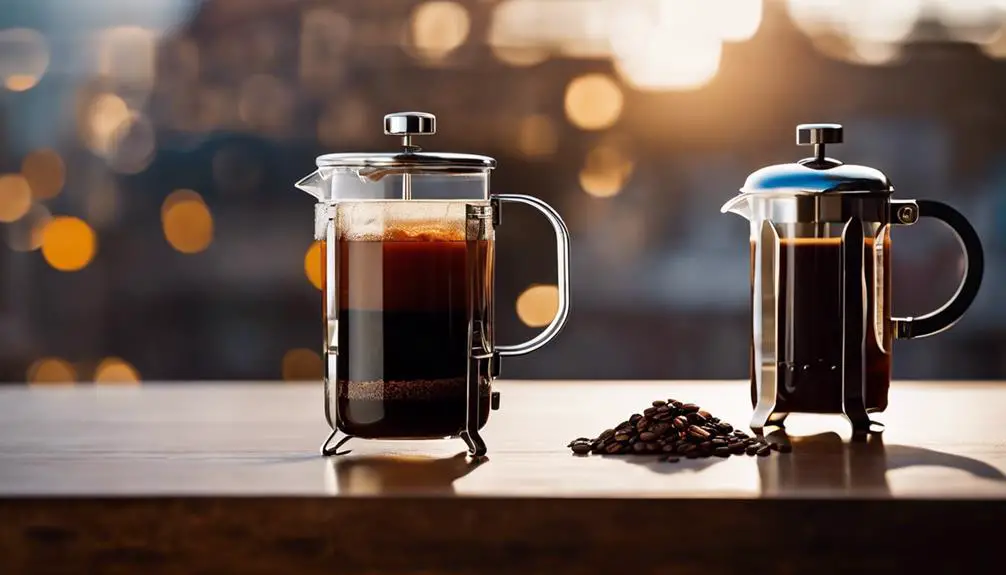
When comparing French Press to Cold Brew Press, you’ll notice distinct differences in flavor profiles. French Press coffee tends to be bold and robust, often with a full-bodied taste and rich aroma.
On the other hand, Cold Brew Press offers a smoother, milder flavor with subtle undertones, creating a refreshing and less acidic brew.
French Press
When comparing French press and cold brew press, you’ll notice distinct differences in flavor notes, acidity levels, and body.
French press coffee tends to highlight rich and robust flavor profiles with a fuller body, while cold brew press often showcases smoother, less acidic characteristics.
Understanding these nuances can help you choose the brewing method that best suits your taste preferences.
Flavor Notes
Enhancing the rich aroma and bold flavor of the coffee beans, the French Press brewing method produces a robust and full-bodied cup of coffee.
- Bold Flavor: French Press captures the intricate flavor profiles of the beans.
- Full-Bodied Texture: Achieve a rich and velvety mouthfeel.
- Aromatic Experience: Enjoy the intense aroma that fills the room.
- Robust Finish: Delight in a satisfyingly strong and flavorful aftertaste.
Acidity and Body
For French Press coffee, the acidity levels are typically lower compared to other brewing methods, resulting in a fuller body and smoother taste profile.
- Acidity balance is mellow, enhancing body complexity.
- Flavor perception is rich with deep notes.
- The brewing temperature influences the extraction process.
- French Press highlights bold flavors and a velvety mouthfeel.
Cold Brew Press
When comparing French Press and Cold Brew Press, you’ll notice distinct differences in flavor notes, acidity levels, and body.
Cold Brew Press often offers a smoother, less acidic taste compared to French Press.
The brewing method you choose can significantly impact the overall taste experience.
Flavor Notes
Comparing the flavor notes between French Press and Cold Brew Press reveals distinct differences in the characteristics of the cold brew’s smoother, less acidic profile.
- Cold Brew Press offers a mellow flavor with subtle hints of chocolate.
- Its taste is often described as less bitter and more rounded.
- Cold brewing brings out the natural sweetness of the coffee beans.
- The flavor profile of Cold Brew Press is refreshing and ideal for those seeking a less acidic brew.
Acidity and Body
Exploring the acidity and body of Cold Brew Press unveils a distinct contrast to the characteristics found in French Press coffee.
- Cold Brew Press offers a smoother, less acidic taste profile due to its extended brewing time.
- The body dynamics of Cold Brew Press tend to be fuller and rounder compared to the French Press.
- Taste preferences may lean towards Cold Brew Press for those seeking a milder flavor experience.
- Unique brewing techniques contribute to the distinct acidity and body in Cold Brew Press.
French Press vs Cold Brew Press: Advantages and Disadvantages
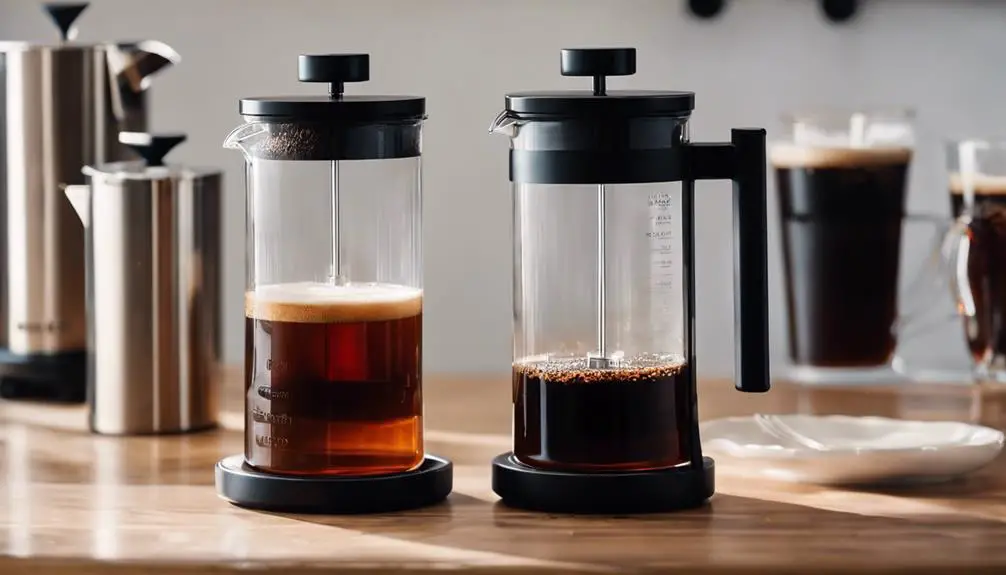
When choosing between a French Press and a Cold Brew Press, you’ll find that the French Press offers a fuller-bodied coffee with more oils and sediment due to its steeping method.
On the other hand, the Cold Brew Press offers a smoother, less acidic coffee with a longer shelf life as it’s brewed without heat.
Consider these factors when deciding which method best suits your coffee preferences and lifestyle.
French Press
Advantages of French Press:
- Offers rich and full-bodied coffee
- Disadvantages of French Press:
- Requires more cleanup and maintenance
Advantages of Cold Brew Press:
- Delivers a smooth and less acidic brew
- Disadvantages of Cold Brew Press:
- Demands more time and patience
Pros
Comparing the French Press to the Cold Brew Press, one notable advantage of the French Press is its ability to extract bold and rich flavors from the coffee grounds.
Customizable Brew Strength: Adjust the steeping time to control the intensity of your coffee.
Full Extraction of Oils: French Press method retains natural oils, enhancing the coffee’s texture.
Quick Brewing Process: Enjoy a flavorful cup of coffee in just a few minutes.
Simple Cleanup: Easy to disassemble and clean after use.
Cons
To explore the drawbacks of the French Press in comparison to the Cold Brew Press, consider the following disadvantages:
- Cold brew enthusiasts might find the French press doesn’t cater to their taste preferences.
- The French press can sometimes result in a more sediment-filled cup compared to the Cold Brew Press.
- Cleaning a French press can be more labor-intensive than using a Cold Brew Press.
- The French press lacks the convenience factor of a Cold Brew Press for some users.
Cold Brew Press
When comparing French Press and Cold Brew Press, you’ll find that each method has its own set of pros and cons. Understanding these advantages and disadvantages will help you choose the brewing method that best suits your preferences and lifestyle.
Let’s weigh the benefits and drawbacks to see which press wins out for your coffee needs.
Pros
Using a cold brew press allows for a smoother and less acidic coffee experience compared to the French press method.
- Enhanced Flavor: Cold brew presses extract coffee flavors more subtly.
- Lower Acidity: Ideal for those sensitive to acidity in coffee.
- Longer Shelf Life: Cold brew coffee stays fresh longer.
- Versatile Brewing: Cold brew presses offer flexibility in brewing methods.
Cons
While the cold brew press offers various benefits, it also comes with some drawbacks worth considering.
- Cold brew can be more expensive than traditional brewing methods, impacting your budget.
- The brewing process takes longer, requiring advanced planning.
- Some coffee enthusiasts find the taste of cold brew to be too mild or less flavorful.
- Cold brew may not suit everyone’s taste preferences, especially those who prefer stronger coffee profiles.
French Press vs Cold Brew Press: Ideal Use Cases and Preferences
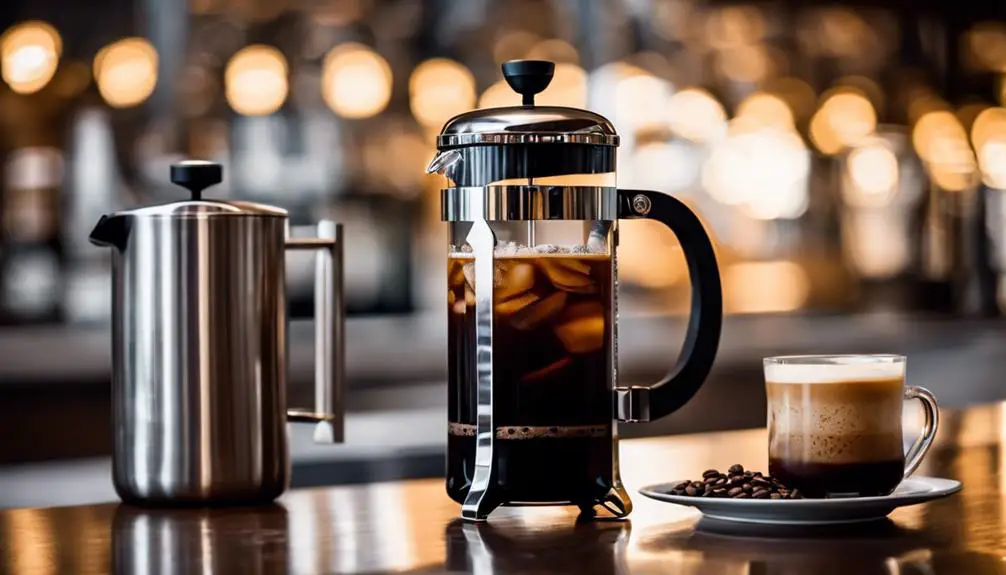
When deciding between a French Press and a Cold Brew Press, consider your preference for a robust and full-bodied coffee with the French Press or a smoother, less acidic brew with the Cold Brew Press.
Your ideal use case might involve enjoying a bold morning cup with the French Press or savoring a refreshing cold brew on a hot afternoon with the Cold Brew Press.
Understanding your taste preferences and desired coffee experience will guide you in choosing the best brewing method for your daily routine.
French Press
When deciding between a French Press and a Cold Brew Press, consider the best scenarios for use and the target audience.
Understanding the specific situations where each method shines can help you make the most of your brewing experience.
Tailoring your choice to suit the preferences of those who’ll enjoy the coffee can lead to a more satisfying cup.
Best Scenarios for Use
Optimally steeping coffee grounds in a French Press allows for a robust and flavorful extraction that caters to those who enjoy a rich and full-bodied brew.
- Start your morning with a pick-me-up that’s bold and aromatic.
- Enhance your outdoor picnics with a fresh brew that packs a punch.
- Elevate your work-from-home days with a coffee that fuels your creativity.
- Host delightful weekend brunches showcasing a smooth and indulgent cup.
Target Audience
Steeping coffee grounds in a French Press caters to individuals who appreciate a bold and full-bodied brew, ideal for those seeking a robust and flavorful coffee experience.
- Coffee preferences: French Press appeals to those who enjoy the rich taste of coffee.
- Brewing techniques: French Press offers a hands-on approach to brewing.
- Taste preferences: It provides a full-bodied and aromatic cup.
- Equipment options: French Press allows customization for a personalized coffee experience.
Cold Brew Press
When considering Cold Brew Press and French Press for your coffee needs, it’s essential to understand the best scenarios for use and the target audience each caters to. Knowing the ideal use cases can help you pick the right brewing method based on your preferences and coffee habits.
Whether you’re a casual coffee drinker seeking convenience or a coffee enthusiast looking for specific flavor profiles, recognizing these distinctions will guide you in selecting the perfect brewing press for your lifestyle.
Best Scenarios for Use
For those who prefer a smoother, less acidic coffee experience with subtle flavor notes, the Cold Brew Press is ideal for creating a refreshing and mellow brew.
- Custom Flavor Infusions: Easily experiment with different flavors by infusing fruits, herbs, or spices during the brewing process.
- Long-Lasting Freshness: Cold brewing results in a concentrate that can be stored for up to two weeks without losing its flavor.
- Low Acidity: Enjoy a gentle brew that’s gentle on the stomach and teeth.
- Summer Delight: Perfect for hot days, offering a cool and invigorating coffee option.
Target Audience
If you seek a coffee experience that prioritizes smoothness, freshness, and low acidity, the Cold Brew Press caters to a diverse audience with these preferences.
- Coffee preferences: Cold Brew Press appeals to those who enjoy less acidic coffee.
- Consumer trends: This brewing method aligns with the trend towards smoother coffee profiles.
- Brewing techniques: Cold Brew Press uses a unique steeping process that results in a distinct flavor.
- Taste preferences: Ideal for individuals who appreciate the nuanced and mellow flavors in their coffee.
Conclusion
In the battle of French Press vs Cold Brew Press, it all comes down to your taste preferences.
Imagine waking up to the rich, bold flavors of French press coffee, or sipping on the smooth, mellow notes of cold brew press on a hot summer day.
Whichever method you choose, both offer unique brewing processes and delicious results.
So go ahead, pick your favorite and enjoy every sip!

